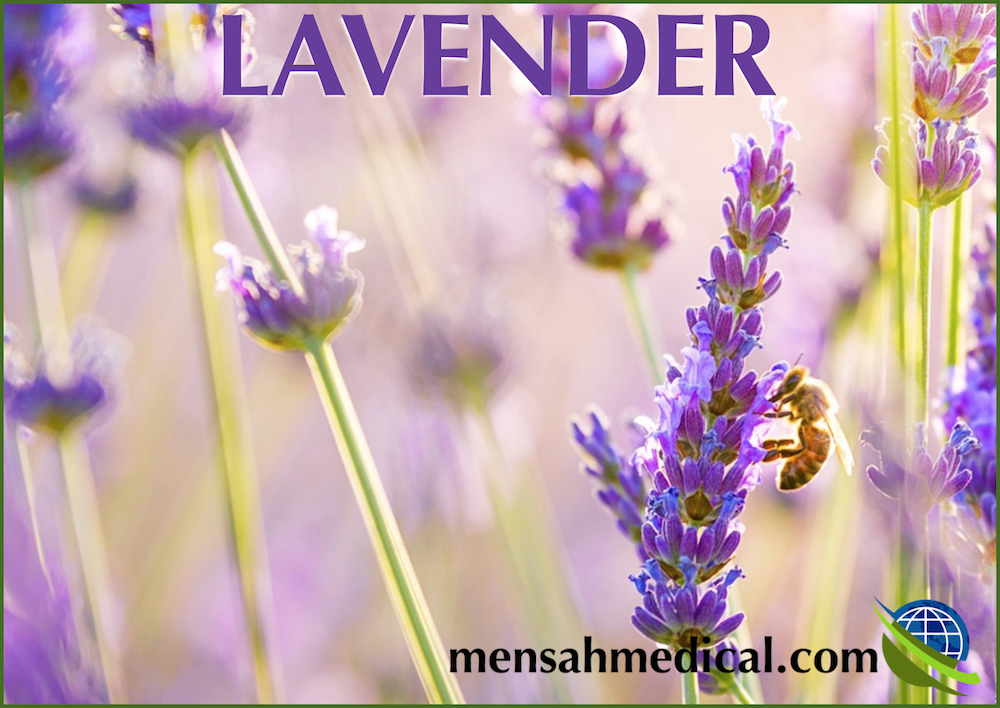Are you using lavender oil for allergies and anxiety?
One of the most common botanicals in use among the general population is lavender oil. This oil comes from a variety of species of perennial plants that originated in the Mediterranean and are closely related to the mint family. Dried lavender has also been used internally as a tea. The species Lavandula angustifolia (formerly called L. officinalis) is used primarily as a medicinal, although all lavenders have medicinal properties of some kind.
Folks tend to use it to relieve stress and combat headaches. They may also reach for it to clean wounds, and add it to a bath to help alleviate aches and pains. It has been shown to have antibacterial and antifungal properties against many species of bacteria. They claim it will ease irritability, panic attacks, and inner tension in folks who use it. It’s also a natural antihistamine and is beneficial as a topical treatment for people who suffer from hay fever and inhalant allergies.
Patients need to use lavender oil with a bit of caution. First of all, one should never ingest it by mouth or inject it. Patients need to also be aware that in some cases, it can cause nausea, vomiting, and headaches when inhaled or applied to the skin. It has been widely known to cause contact dermatitis in some users. This is well documented in studies, mainly due to the presence of linalool, one of its main constituents.
There is plenty of research on the benefits of lavender to improve relaxation and lower energy levels. Lavender has been shown in many research studies to aid the parasympathetic nervous system, by relaxing the body and slowing energy levels. This function is in direct contrast with the job of the sympathetic nervous system, which controls our body’s ‘fight or flight’ response. This means that lavender has the potential to help folks balance out those temporary stressful situations when their body is under situational stress, like in a job interview or a first date.
Lavender for Oil State Anxiety, Not Necessarily for Trait Anxiety
Lavender oil has proven to work in cases where folks have situational anxiety, such as a doctor or dentist appointment, your first day on a new job, or having to stand up in front of an audience to give a speech. Various research studies show that anxiety can be lowered with the use of lavender aroma therapy. State anxiety is when you are in a temporary situation where you are forced to endure an unpleasant event. Once the event is over, your anxiety ends.
While I do believe lavender oil aroma therapy may be used as an additional anxiety treatment option for our patients, lavender aroma therapy, on its own, is not an effective treatment for general anxiety disorders.
Lavender can be quite helpful as a part of a comprehensive treatment plan, but patients need to understand that as an isolated treatment protocol, lavender is not enough for folks diagnosed with an anxiety disorder. There really isn’t adequate research to claim that it can benefit patients with various kinds of anxiety disorders in either the short or long term.
Does this mean you shouldn’t use it? Absolutely not. Just understand that it is something that can be added to your Advanced Nutrient Therapy and not something that can replace it.
Why Trait Anxiety Differs
Folks with an anxiety disorder regularly experience excessive worry over long periods of time that are not associated with the start and end of temporary events which may cause anxious feelings. In our practice, we see various biochemical imbalances that often contribute to anxiety disorders and require specific nutrient therapy for the resolution of symptoms. While patients can choose to use lavender oil in addition to our Advanced Nutrient Therapy, the use of aromatherapy in isolation is not a viable alternative for trait anxiety conditions.
Drug Interactions with Lavender Oil
Patients on cholesterol-lowering medications and anticoagulants need to be aware that lavender oil can negatively affect efficacy. Patients on certain anti-depression medications or sleep medications, or who are on pain medications like codeine will likely see an increase in drowsiness while using lavender oil.
There is also a possibility of bleeding that can result from the use of lavender oil with aspirin, acetaminophen, ibuprofen, and other pain relievers. Bleeding has also been reported as a possible side effect when lavender oil is taken with ginkgo biloba and garlic.
Patients who are already taking an antidepressant, anti-anxiety medication like lorazepam, diazepam, or alprazolam, or a narcotic like oxycodone need to consult a physician before using lavender oil as it can enhance the effects of these medications.
Resources
- Moss M, Cook J, Wesnes K, Duckett P. Aromas of rosemary and Lavender essential oils differentially affect cognition and mood in healthy adults. Int J Neurosci. 2003;113:15–38. [http://www.ncbi.nlm.nih.gov/pubmed/12690999].
- Roller S, Ernest N, Buckle J. The antimicrobial activity of high-necrodane and other lavender oils on methicillin-sensitive and -resistant Staphylococcus aureus (MSSA and MRSA). J Altern Complement Med. 2009 Mar;15(3):275-9. doi: 10.1089/acm.2008.0268. [http://www.ncbi.nlm.nih.gov/pubmed/19249919].
Albert Mensah, MD, BCIP
 As a physician in this specialized field since 2005, Dr. Mensah, board certified in integrative pediatrics by the American Association of Integrative Medicine, has treated over 3,000 patients with advanced targeted nutrient therapy. He serves on the board at Walsh Research Institute and serves as a clinical instructor for WRI’s international doctor training programs around the world. Dr. Albert Mensah received his undergraduate degree from Northwestern University (Evanston, Illinois) and his medical degree from Finch University of Health Sciences-Chicago Medical School. Dr. Mensah’s residency was in Family Medicine at Swedish Covenant Hospital (Chicago). Following residency, he completed additional fellowship training in academic development at JHS Cook County Hospital (Chicago). From 2005 to 2008, Dr. Mensah treated patients at the former Pfeiffer Treatment Center, a not-for-profit organization and outpatient clinic specializing in the treatment of biochemical imbalances including children with autism. Prior to joining Pfeiffer, Dr. Mensah was a physician at Melrose Park Clinic in Illinois. Dr. Mensah co-founded Mensah Medical in 2008 with Dr. Judith Bowman.
As a physician in this specialized field since 2005, Dr. Mensah, board certified in integrative pediatrics by the American Association of Integrative Medicine, has treated over 3,000 patients with advanced targeted nutrient therapy. He serves on the board at Walsh Research Institute and serves as a clinical instructor for WRI’s international doctor training programs around the world. Dr. Albert Mensah received his undergraduate degree from Northwestern University (Evanston, Illinois) and his medical degree from Finch University of Health Sciences-Chicago Medical School. Dr. Mensah’s residency was in Family Medicine at Swedish Covenant Hospital (Chicago). Following residency, he completed additional fellowship training in academic development at JHS Cook County Hospital (Chicago). From 2005 to 2008, Dr. Mensah treated patients at the former Pfeiffer Treatment Center, a not-for-profit organization and outpatient clinic specializing in the treatment of biochemical imbalances including children with autism. Prior to joining Pfeiffer, Dr. Mensah was a physician at Melrose Park Clinic in Illinois. Dr. Mensah co-founded Mensah Medical in 2008 with Dr. Judith Bowman.
Save
Save
